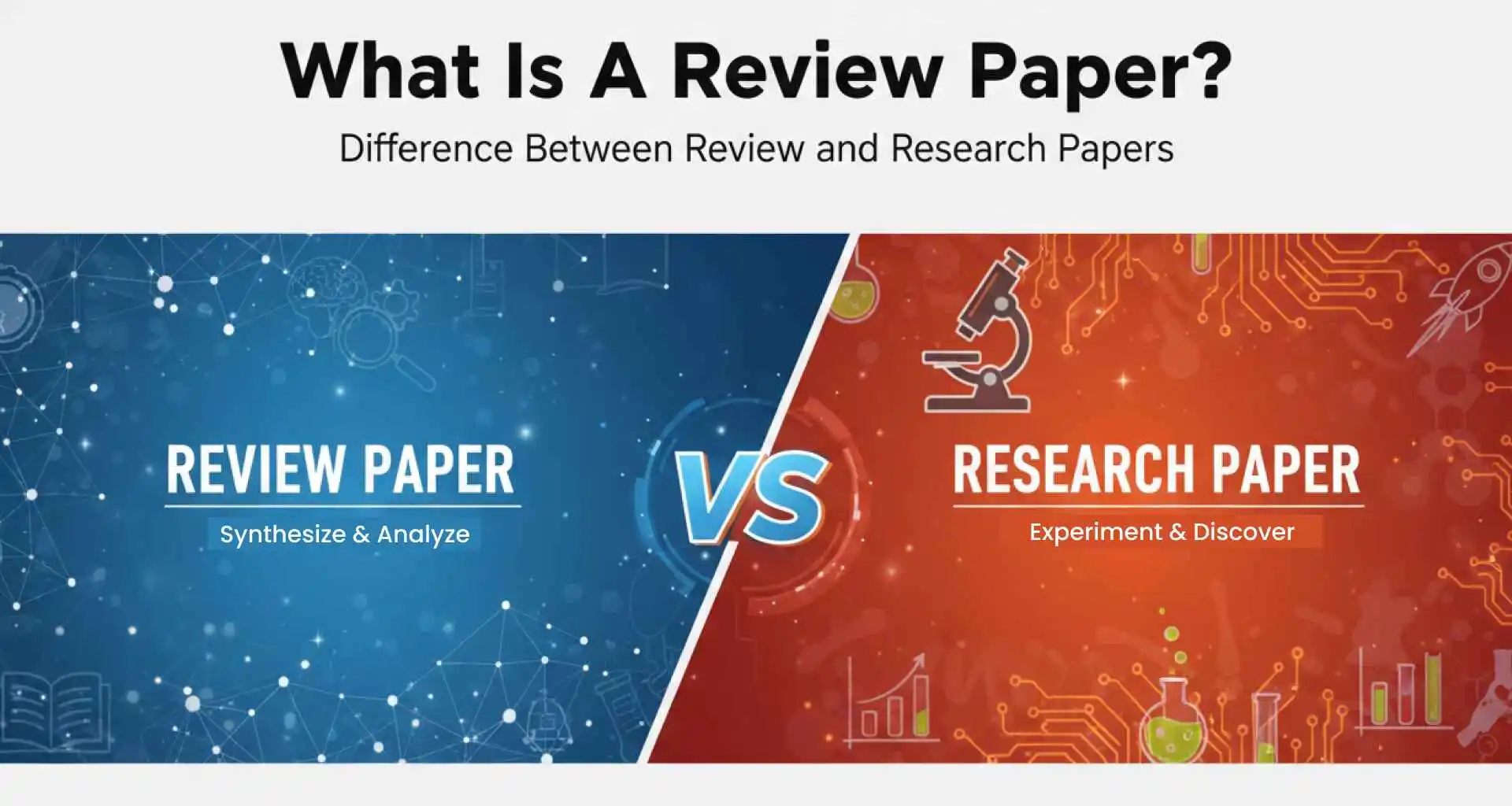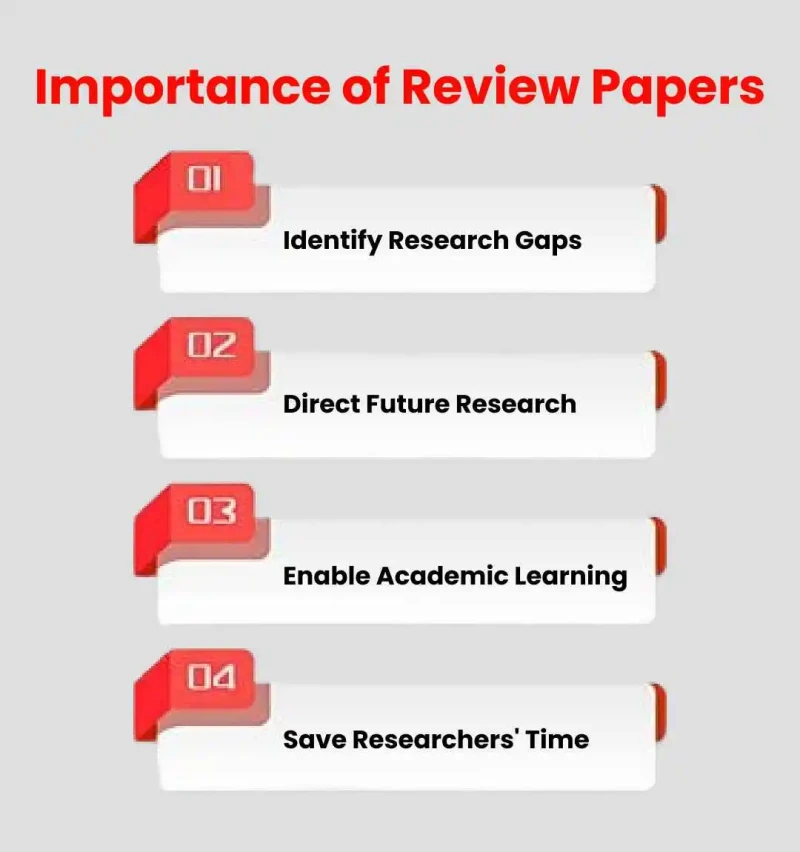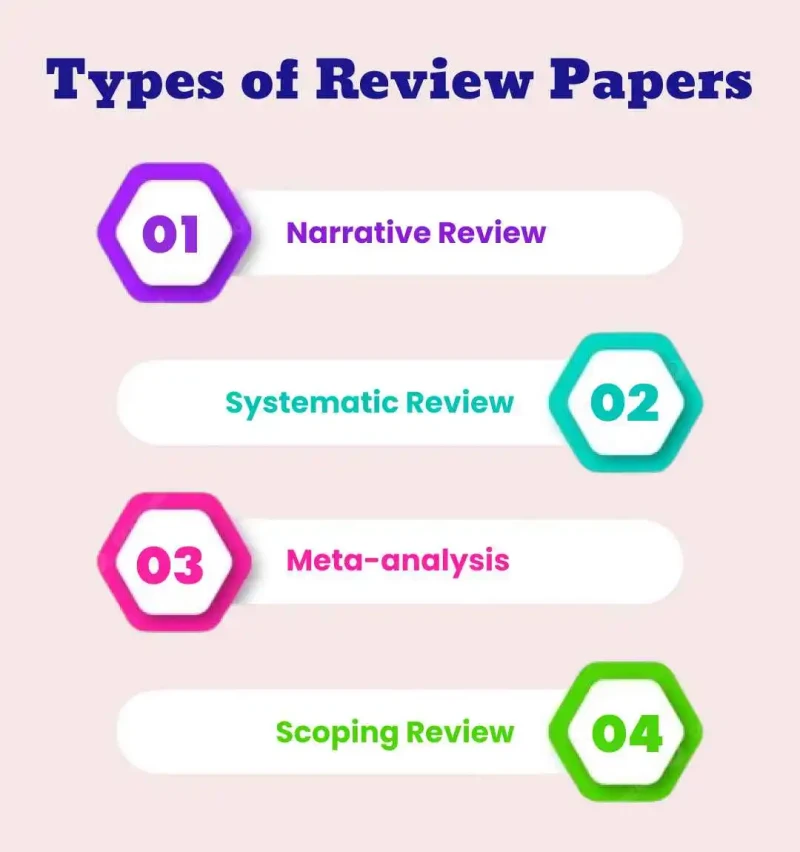Importance of Peer Review in Academic Publishing: Ensuring Research Quality and Credibility
Unlock the importance of peer review in academic publishing. Learn how to validate research, build credibility, and get your manuscript published faster

Luca
A review paper is an academic piece that synthesizes, evaluates, and interprets existing research on a specific topic instead of presenting new experiments or findings. It helps scholars identify trends, gaps, and future research directions.
In this blog, you’ll learn what is review paper, why it matters in academia, and how it differs from a traditional research paper in purpose, structure, and intent.

Identify Research Gaps: They point out what has been researched and uncover areas that require additional research.
Direct Future Research: Through synthesizing current evidence, review papers steer new research into significant questions.
Enable Academic Learning: They equip students and researchers with a comprehensive knowledge of an issue without reading each single study.
Save Researchers' Time: Rather than reading multiple individual studies, one high-quality review paper can condense critical conclusions.

All review papers are not identical. On the basis of purpose and level of analysis, researchers can prepare:
Narrative Review: Provides a qualitative overview of studies, usually examining wide trends or themes in an area. Use this if a topic is new and changing or there is not sufficient data to justify statistical evaluation.
Systematic Review: Adheres to a systematic process of searching, selecting, and critically appraising studies. It is the best method for evidence-based conclusions.
Meta-analysis: Synthesizes findings from several studies statistically, quantitatively offering insights into a research question.
Scoping Review: Traces the literature on a topic, identifying trends, gaps, and directions for future research but not conducting in-depth analysis.
Every form of review paper has a specific function, assisting researchers, students, and practitioners in understanding the state of existing knowledge and pinpointing gaps for future research.
A review paper is not merely a replication of previous studies—it's an expertly put-together analysis that contributes value to the research world. This is what makes a review paper exceptional:
Rather than new data or experiments, a review paper integrates results from several studies to present a systematic story. It pieces together the results of various research work, detects patterns, and gives a straightforward summary of what is known at this point. Imagine developing a map of research indicating where the area is and where it is going.
A review paper highlights research gaps, areas where knowledge is incomplete or inconsistent. It points out under-researched topics, methodological limitations, and conflicting findings. Identifying these gaps guides future research, especially for PhD scholars and early-career researchers.
A review paper is more than an overview. It critiques the literature, assessing the quality, reliability, and relevance of each study. It accomplishes the following:
Highlighting strengths and weaknesses of methodology
Identifying biases or limitations of prior studies
Comparing contradictory findings to provide a balanced perspective
Through synthesis, gap identification, and critical appraisal, a review paper is an efficient tool that guides researchers, practice, and is a precursor to subsequent studies.
A research paper presents original findings from a study or experiment, including the methodology, data analysis, results, and conclusions, aiming to contribute new knowledge to a field.
When writing a research paper reports new work. It may be experiments, surveys, interviews, or computational modeling, everything done to answer some new question or test a hypothesis. Essentially, it's your contribution to growing knowledge in an area.
Primary research entails gathering original data first-hand from sources to provide answers to particular questions.
This may be through surveys, interviews, experiments, or observations to enable researchers to obtain firsthand information specific to their research.
Secondary research entails the examination of already collected data from others.
Books, articles, reports, or databases are used to derive information, conserving time while giving background and context to a study.
|
Section |
Review Paper |
Research Paper |
|
Abstract |
Summarizes the overall scope, key themes, main findings, and research gaps |
Highlights the study’s objective, methodology, key results, and conclusion |
|
Introduction |
Provides background, explains why the review is needed, and states its aim |
Presents background, identifies the research gap, and states the research question or hypothesis |
|
Methodology |
Explains literature search strategies, inclusion/exclusion criteria, especially in systematic reviews |
Describes original data collection methods (sampling, instruments, experimental design) |
|
Results / Synthesis |
Organizes findings by themes, categories, or aggregated insights |
Shows raw study data, including tables, figures, and statistical analysis |
|
Discussion / Analysis |
Interprets trends, discrepancies, and gaps; proposes future research directions |
Discusses findings in context, compares with previous literature, and notes limitations |
|
Conclusion |
Summarizes key patterns, remaining gaps, and recommendations |
Summarizes your study’s contributions and practical or theoretical implications |
|
References / Citations |
Cites many sources broadly, including older foundational studies |
Focuses on recent primary studies directly relevant to methods and results |
Understanding the key differences between writing a review paper and a research paper is crucial for choosing the right type of academic work to pursue.
|
Aspect |
Review Paper |
Research Paper |
|
Objective |
Summarize, synthesize, critique existing knowledge |
Generate new data/insight |
|
Data Sources |
Secondary- previouslypublished studies |
Primary- Experiments, surveys, observations |
|
Methodology |
Literature search, appraisal, synthesis |
Empirical design, sampling, analysis |
|
Contribution / Outcome |
New perspectives, mapping gaps, setting agenda |
New discoveries, testing hypotheses, causal inference |
|
Writing style |
Discursive ,integrative,sometimes narrative |
More technical, focused on methodology and results |
Employ a review paper to examine trends, review literature, or spot research gaps. Use a research paper to publish new experiments or data.
Systematic reviews and meta-analyses are prevalent in medicine, psychology, and social sciences.
Authoring review papers may assist in developing expertise and credibility prior to conducting original research.
Seeking the help of a PhD writing service can be worthwhile if you desire professional help with structuring and writing an efficient review paper.
Choose a Targeted Topic: Select a topic with adequate existing literature and apparent knowledge gaps.
Systematic Literature Search: Browse databases such as PubMed, Scopus, and Google Scholar to find all studies of relevance.
Organize and Synthesize: Classify studies according to themes, methods, or results. Do not use random listings.
Have Critical Mindset: Emphasize strengths, weaknesses, and biases in studies. Offer your analysis instead of summaries.
Use Clear Structure: Ensure your review paper has a clear structure: introduction, body, analysis, and conclusion.
A vague structure will create confusion among the readers and disintegrate your argument. The purpose of every section should be deep, i.e., introduction, methodology, discussion, conclusion. Logically organize the studies, e.g., by theme, method, or time, to have the natural flow of the paper and make trends or gaps stand out.
Use of a few papers may cause your review to be biased or incomplete. Work with a wide range of high quality of research that reflects different points of view and discoveries. This proves the adequate research and reinforces your conclusions.
The main mistake is to take a review and act as it was done in a research paper where new experiments or unsatisfied claims are added. A review is not primary data; it must sum up and critically assess an existing research. Stick to evaluation, analysis and synthesis.
Academic success is dependent on knowing the difference between review papers and research papers. A review paper provides the examination and critique of already-presented research, whereas the research paper contains new information and fresh insights.
To have a real impact on academia, you should study what and at what time to use each of the types. Get this guide, maintain a clear structure, and consult a PhD Service when there is a need to do so. Such a move may transform a mere paper into a masterpiece.
Unlock the importance of peer review in academic publishing. Learn how to validate research, build credibility, and get your manuscript published faster
Master the top methods of primary data collection in research methodology. Learn to use surveys, interviews, and experiments to gather original, high-quality data.
Don’t write your methodology without reading this. Learn why purposive sampling is essential for case studies and how to define your inclusion criteria. Url:purposive-sampling
Master the chapterization of thesis to ensure logical flow. Learn the standard academic framework for organizing research into a professional, approved document.
A practical guide to sentiment analysis research papers covering methodologies, datasets, evaluation metrics, research gaps, and publication strategies.
Master data analysis for research papers. Learn quantitative and qualitative methods, cleaning, and reporting standards to ensure your study meets journal rigour.